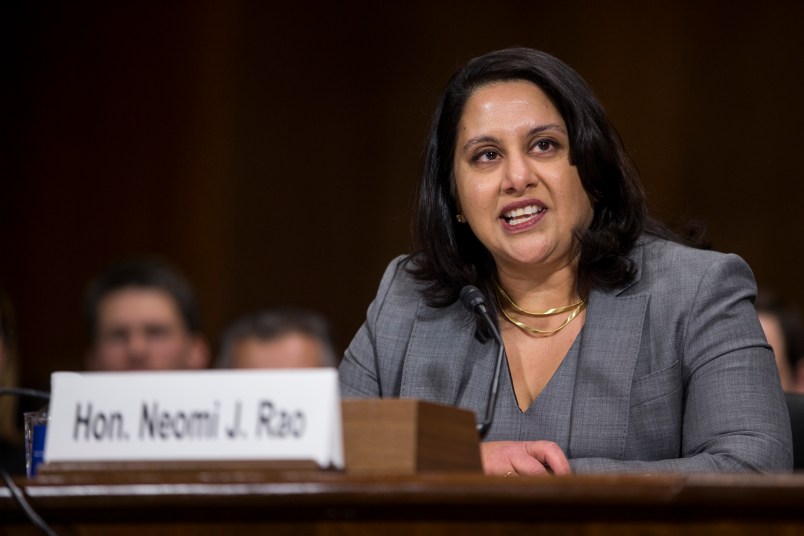If a Trump-appointed appellate judge could have her way, Congress could only investigate presidential misconduct if it formally opened an impeachment inquiry — and went through an extensive process that included a full House vote.
For now, the views that Judge Neomi Rao expressed in a dissent Friday will have no effect in a dispute between House Democrats and President Trump over the House’s subpoena of his accounting firm for his financial records. The appellate panel on which she sat voted 2-1 to uphold the subpoena.
But her dissenting opinion laid out an extraordinarily narrow of view of when and how Congress can probe whether the President or other executive officials acted illegally — a view that grows even starker when one considers that the Justice Department has barred itself from prosecuting a sitting president.
She claimed that if it is issuing a subpoena as part of an investigation of presidential misconduct, Congress must first open a impeachment inquiry. She also suggested that the courts have the ability to decide what constitutes an impeachable offense.
She dismissed the House Democrats arguments that the subpoenas they were issuing also could also serve a legislative purpose and accused Democrats of trying to “whitewash” the purpose of the subpoenas.
“When Congress seeks information about the President’s wrongdoing, it does not matter whether the investigation also has a legislative purpose. Investigations of impeachable offenses simply are not, and never have been, within Congress’s legislative power,” she said.
The case arose when President Trump, through his personal attorneys, sought to block a subpoena the House issued Mazars, his accounting firm. Trump — whose arguments later got the backing of the Justice Department — asserted that the House was usurping the executive branch’s law enforcement authorities. A district court judge sided with the House and upheld the subpoena, prompting the appeal to D.C.’s federal appellate court.
House Democrats had pointed to the legislation they already passed imposing new requirements on presidential candidates turning over their tax returns and had argued further probing Trump’s finances would help them understand whether they need to further legislate the issue.
Rao blew off the claim, even as legal precedent has said it is not the court’s place to inquire into the motives of Congress.
“The Committee’s stated interest in remedial legislation may support any number of investigations, including into the conduct of agencies and how officials administer the laws. Yet a legislative purpose cannot whitewash this subpoena, which — by the Committee’s own description—targets allegations of illegal conduct by the President,” she wrote.
She said that Congress’ exercise of legislative power only applied when lawmakers were enacting “general, prospective rules for the whole of society.”
“Yet Congress cannot prosecute and decide specific cases against individuals,” she said, adding those powers fell to the executive branch and the judiciary.
“With respect to Congress’s investigative powers, the original meaning and historical practice align—all three branches have consistently distinguished between investigations for legislative purposes and investigations targeting wrongdoing by an impeachable official,” she claimed. “Moreover, the historical evidence demonstrates that Congress often begins an investigation into the executive branch with general questions properly pertaining to legislation; however, if an inquiry turns to suspicions of criminality, Congress moves that part of the investigation into impeachment or ends the inquiry into the impeachable official. Thus, even a valid legislative purpose has never been thought to justify probing specific accusations of wrongdoing by impeachable officials.”
Rao’s dissent Friday echoed the complaints currently being aired by White House and Hill Republicans about the impeachment probe into Trump’s Ukraine dealings. They’ve claimed that the current ongoing Ukraine inquiry — which was not what was being litigated in the D.C. appellate court case — was illegitimate because there was not a full House vote opening the investigation.
Like the talking points laid out in a White House counsel’s letter this week, Rao said that the House was obligated to guarantee the executive branch certain due process rights if it was going to probe wrongdoing.
Even within its language about impeachment, there is no such requirement in the Constitution, which says simply that that the House has the “sole Power of Impeachment.”
Rao’s dissent appeared at odds with the typical (and ostensible) modus operandi of conservative legal advocates who say judges should not read into the Constitution powers and rights that are not explicitly there.
But Rao went even further. She hinted that courts could also say what constitutes an impeachable offense, which is defined broadly by the Constitution as “treason, bribery, or other high crimes and misdemeanors.”
“As the Committee has not raised the impeachment power as a basis for this subpoena, questions regarding whether such a subpoena could issue under the impeachment power are outside the scope of this opinion, as are other questions regarding the justiciability of the impeachment power or the specific scope of impeachable offenses,” she wrote in a footnote.







I am sure she will change her mind once its a Dem POTUS.
this is why mcconnel has worked to cram these right wing judges into position…to set up a firewall against prosecution.
I thought Republicans hate people who (attempt to) legislate from the bench…
The Honorable Hacki J. Hackmeister
BZZZZTTT! Thank you for playing “Who’s Read the Constitution!?”
Johnny, what parting gifts do we have for our contestant?